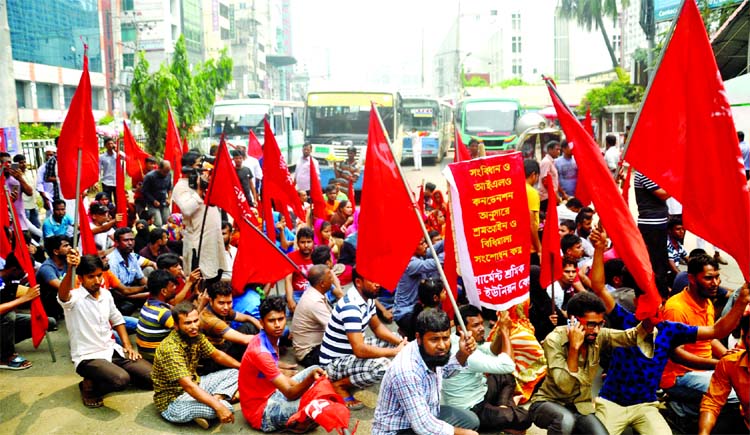
Special Correspondent :
Labour rights organisations have rejected the monthly minimum wage fixed by the government for the country’s 40 lakh garment workers saying it is still not enough to allow workers to meet their basic needs.
Denouncing the minimum wage, the rights organisations staged street protests in Dhaka on Friday. Workers’ leaders from the rallies threatened to lodge countrywide protest to press home their wage hike demands of Tk. 16,000 (US$ 192)..
The new wage was set at Tk 8,000 (US$95) on Thursday as per the recommendation of the Minimum Wage Board, a special government appointed body formed to review the current minimum wage.
“We cannot accept this wage as it is too low to meet the workers basic needs,” Joly Talukder, a leader of Garment Workers’ Trade Union Centre told The New Nation.
Earlier, labour rights groups demanded Tk 16,000 as monthly minimum wage carefully considering various aspects, including cost of living, inflation trends and minimum wages in major countries that are producing readymade garments.
Although Bangladesh’s garment industry has made tremendous progress meeting stringent safety standards and annual export earnings from the sector grew from about US$ 9.3 billion dollars in 2007 to US$ 30 billion in 2018, garment workers here are still paid
one of the lowest minimum wages in the world.
“Workers are still struggling to survive as the factory owners are paying them lowest wages in the world. It is injustice and inhuman,” said Joly Talukder, adding, “The new monthly minimum wage of Tk 8000 is still not enough to lead a dignified life.”
The new minimum monthly wage marked a 51 per cent rise (from current Tk 5,300) and would come effective from December next.
“We reject the minimum wage as it has been made in line with the factory owners’ proposal,” Moshrefa Mishu, President of Garment Workers Unity Forum (GUWF) told The New Nation.
She said they have repeatedly tried to convince the government and factory owners that a worker having a family of six members cannot survive if Tk 16,000 was not fixed as a minimum wage.
“But they did not pay any heed to our demands and fixed the wage irrationally which forced them for organizing fresh protest programme demanding review of the proposed wage hike,” said Mishu.
She further said there is a scope for increasing the wages, as the government is yet to issue notification in this regard.
“The minimum wages is absolutely unacceptable. I don’t blame the industry owners for this, rather, hold the trade union leaders responsible for their lack of unity,” Towhidur Rahman, General Secretary of the IndustriALL Global Union, Bangladesh Chapter (IBC), told The New Nation.
He said, “We have 16 workers’ organizations with separate voices and ideologies. The industry owners took advantages of this and convinced the authorities to fix a lower minimum wage for garment workers.
Labour rights organisations have rejected the monthly minimum wage fixed by the government for the country’s 40 lakh garment workers saying it is still not enough to allow workers to meet their basic needs.
Denouncing the minimum wage, the rights organisations staged street protests in Dhaka on Friday. Workers’ leaders from the rallies threatened to lodge countrywide protest to press home their wage hike demands of Tk. 16,000 (US$ 192)..
The new wage was set at Tk 8,000 (US$95) on Thursday as per the recommendation of the Minimum Wage Board, a special government appointed body formed to review the current minimum wage.
“We cannot accept this wage as it is too low to meet the workers basic needs,” Joly Talukder, a leader of Garment Workers’ Trade Union Centre told The New Nation.
Earlier, labour rights groups demanded Tk 16,000 as monthly minimum wage carefully considering various aspects, including cost of living, inflation trends and minimum wages in major countries that are producing readymade garments.
Although Bangladesh’s garment industry has made tremendous progress meeting stringent safety standards and annual export earnings from the sector grew from about US$ 9.3 billion dollars in 2007 to US$ 30 billion in 2018, garment workers here are still paid
one of the lowest minimum wages in the world.
“Workers are still struggling to survive as the factory owners are paying them lowest wages in the world. It is injustice and inhuman,” said Joly Talukder, adding, “The new monthly minimum wage of Tk 8000 is still not enough to lead a dignified life.”
The new minimum monthly wage marked a 51 per cent rise (from current Tk 5,300) and would come effective from December next.
“We reject the minimum wage as it has been made in line with the factory owners’ proposal,” Moshrefa Mishu, President of Garment Workers Unity Forum (GUWF) told The New Nation.
She said they have repeatedly tried to convince the government and factory owners that a worker having a family of six members cannot survive if Tk 16,000 was not fixed as a minimum wage.
“But they did not pay any heed to our demands and fixed the wage irrationally which forced them for organizing fresh protest programme demanding review of the proposed wage hike,” said Mishu.
She further said there is a scope for increasing the wages, as the government is yet to issue notification in this regard.
“The minimum wages is absolutely unacceptable. I don’t blame the industry owners for this, rather, hold the trade union leaders responsible for their lack of unity,” Towhidur Rahman, General Secretary of the IndustriALL Global Union, Bangladesh Chapter (IBC), told The New Nation.
He said, “We have 16 workers’ organizations with separate voices and ideologies. The industry owners took advantages of this and convinced the authorities to fix a lower minimum wage for garment workers.

